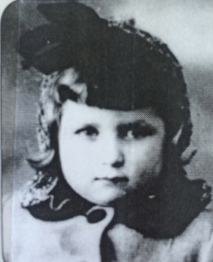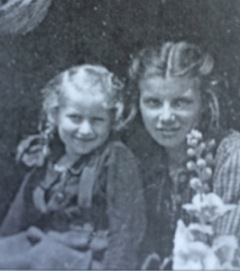"When a person doesn't have gratitude, something is missing in his or her humanity. A person can almost be defined by his or her attitude toward gratitude." -- Elie Wiesel
The Time: 1942-1945. The Holocaust.
The Setting: Czortkow Ghetto, Nazi-occupied Poland (now Ukraine). Attic of the Dobrucki family home.
The Main Character: Isabelle (Isa/Inka) Hauser, a 3 year-old Jewish girl.
The Plot: Isabelle is saved from the Nazis by a poor Catholic family, the Dobruckis, and hidden in their attic the for better part of three years in the midst of the Holocaust.
The Twist: This is a true story.
Seven decades later I had the privilege of interviewing Isabelle, one of only three Czortkow children -- out of roughly 10,000 -- who survived the Holocaust.
To say I was a bit daunted by the prospect would be a dramatic understatement. Frankly, I was petrified. Was I worthy of this interview? Could I do it justice?
But the minute I arrived in her kitchen, nervous, harried and hungry after a six-hour flight, Isabelle, with a hug and an enormous smile, immediately set me at ease. In fact, she insisted that I eat my airport-to-go sandwich before we got started. (I proceeded to engulf it at her kitchen table while Isabelle sat watching with placid amusement.)
We then moved to Isabelle's room, filled with the photos of a lifetime that almost wasn't, for the interview. And as Isabelle began to talk, time stood still and everything else in the universe dissolved and there was only her story - honest and eye-opening, tragic, inspiring and heroic. One of the last survivors of one of the most horrific atrocities in human history and she recounts the experience with a smile. How is that even possible? Because she views it not through the lens of her loss but of what she sees as the incredible gift that was given to her.
Born on March 19, 1939 into one of the wealthiest families in Czortkow, Isabelle lived in this world as a free girl for only three years before her family lost everything, forced by the Nazis into the infamous Czortkow Ghetto and rendered penniless. The Ghetto, in 1942, full of squalor and starvation, was essentially a way-station en route to Auschwitz. Suffice it to say that little Isa's prospects were dim.
But then a miracle happened. A brave Catholic family, the Dobruckis, arranged to have their 14-year-old daughter, Meva, sneak into the Ghetto and wait at the appointed time below an air-chute in Isa's building. Isa's father slid her down and into the waiting arms of ... freedom. At enormous risk and against all odds, Meva and her family took Isa in and sheltered her for the remainder of the war. (A short time later, Isa's father was taken away to a concentration camp.)
While infinitely improved over conditions in the Ghetto, which had been simply inhuman, Isabelle's life with the Dobruckis was, for years, neither safe nor free. At an age when most girls were discovering dolls and dresses, Isabelle hid from Nazis in an attic, in constant fear. In her interview, she details those harrowing times, her subsequent journey and her ultimate decision, 60-plus years later, to memorialize it all in her now-published autobiography, Isabelle's Attic: The story of a Young Jewish Girl's Survival Against the Nazis.
As she recalls in the following excerpt:
The Germans were trying hard to smoke out the rest of the Jews they thought might still be around. Once again the edict went out that every person whether sick, blind, or crippled was to appear in the city square at seven a.m. on a given day. The Dobruckis went crazy trying to figure out what to do. I've always thought that the sensible thing to have done would have been to hide me in the attic under a bundle of quilts. It would not have been a problem. Telling me not to make a sound would work because I already was well trained in maintaining a sense of silence. But instead, they did the craziest thing-they laid me in the day bed that was in the dining room, in full view. I was only covered to my chin with a warm quilt... [They] kissed me, weeping, 'Do not make a sound. Do not move. Lie here in bed until we come back. Don't be scared, Inka, we will be back.' They disappear and the door shuts... Suddenly I hear a horrendous noise, as if someone is trying to beat down the door. And indeed they kick it in. Two soldiers come into the house and break things as they move through the house...I just lay there staring at the ceiling. They finally walk into the dining room and I lay perfectly still. I only move my eyes... They are so close. I feel them jiggle the bed and now they are laughing... With my eyes closed I was ready to feel a big arm grab me..Are they pretending they don't see me?... Through a tiny slit in one eye, I see their backs... The door shuts... I really can make myself invisible.
As Isabelle tells her story, I'm struck by the total absence from her vocabulary of one word: Not once does she utter the term, "victim". Stunningly, the enduring legacy of all of that she suffered is neither hatred, nor recrimination, nor self-pity, nor guilt, nor cynicism, nor pessimism, nor fear. It is joy; Isabelle is a joyful survivor. And it is an abiding sense of the goodness in the world. Indeed, Isabelle's goal in writing her autobiography was essentially twofold: to help ensure, on the one hand, that the world never forgets the evil that the Nazi regime inflicted on it, but also, and perhaps even more importantly, that we remember the extraordinary human - indeed, at times superhuman -- kindnesses that occurred during the Holocaust.
It is, after all, only through the spontaneous generosity, self-sacrifice and abiding love of other human beings, at enormous risk to life and limb, that Isabelle lived to tell her children and her grandchildren (and, thankfully, all of us) the tale - indeed, that they are alive at all. Her interview is worth sharing with our children and grandchildren, as well, revealing as it does how, in the midst of a brutality that we will never understand -- the like of which we must strive to ensure that we never see again -- love can not only survive, but flower and, in doing so, give people the strength not just to survive, but to thrive. Not just to persevere, but to prosper. Isabelle viewed this as a gift. And that's exactly what the interview she so generously gave is for all of us.
Please visit here to view Isabelle's video in full.
MORE:GenocideIsabelle's Attic



